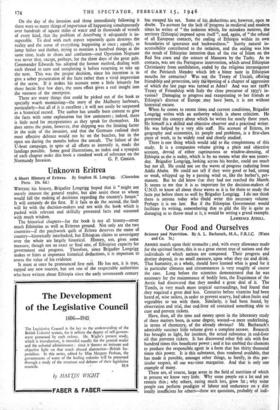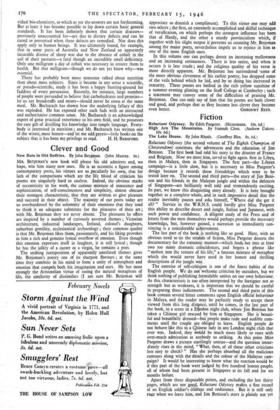Our Food and Ourselves Science and Nutrition. By A. L.
Bacharach, M.A., F.R.I.C. (Watts and Co. 5s.) ARMIES march upon their stomachs ; and, with every allowance made for the spiritual factor, this is to a great extent true of nations and the individuals of which nations are composed. Their progress and destiny depend, in no small measure, upon what they eat and drink. That humanity, as a whole, should have learned what is good for it in particular climates and circumstances is very roughly of course the case. Long before the scientists demonstrated that fat was necessary for the maintenance of bodily heat, the Esquinaaux of the Arctic had discovered that they needed a great deal of it. The Tamils, in Very much more tropical surroundings, had found that they required a great deal less. Centuries before vitamins had been heard of, wise sailors, in order to prevent scurvy, had taken fruits and vegetables to -sea with them. Similarly, it had been found, by observation and trial, that cod-liver oil contained something able to cure and prevent rickets.
Have, then, all the time and money spent in the laboratory study of these matters been, in some degree, wasted—a mere underlining, in terms of chemistry, of the already obvious? Mr. Bacharach's admirably succinct little volume gives a complete answer. Research has brought to light, for instance, the actual substance in cod-liver oil that prevents rickets. It has discovered other fish oils with five hundred times this beneficent power ; and it has enabled the chemists to produce the responsible agent in a form that has thirty thousand times this power. It is this substance, thus rendered available, that has made it possible, amongst other things, to fortify, in this par- ticular respect, all our war-time margarine. And that is only one example of many.
There are, of course, large areas in the field of nutrition of which at present we know very little. Why some people eat a lot and yet remain thin ; why others, eating much less, grow fat ; why some people can perform prodigies of labour and endurance on a diet totally insufficient for others—these are questions, probably of indi- vidual bio-chemistry, to which as yet the answers are not forthcoming. But at least it has become possible to lay down certain basic general standards. It has been definitely shown that certain diseases— previously unaccounted for—are due to dietary defects and can be cured or prevented when these defects are remedied. Nor does this apply only to human beings. It was ultimately found, for example, that in some parts of Australia and New Zealand an apparently incurable disease of sheep was due to the absence of cobalt in the soil of their pastures—a fatal though an incredibly small deficiency. Only one milligram a day of cobalt was necessary to restore them to health. But that milligram—though we do not yet know why—was essential.
There has probably been more nonsense talked about nutrition than about most subjects. Since it became in any sense a scientific, or pseudo-scientific, study it has been a happy hunting-ground for faddists of every persuasion. Recently, for instance, large numbers of people were persuaded to believe that carbohydrates and proteins— let us say breadstuffs and meats—should never be eaten at the same meal. Mr. Bacharach has shown how the underlying fallacy of this was exploded. He has exposed other such fads with an instructed and authoritative common sense. Mr. Bacharach is an acknowledged expert of great practical experience in his own field, and he possesses the rare gift of distilling his knowledge into simple language. Every- body is interested in nutrition ; and Mr. Bacharach has written one of the wisest, most honest—and let me add gayest—little books on the subject that it has been my privilege to read. H. H. BASHFORD.



























 Previous page
Previous page